List of people in both the Bible and the Quran
The Bible and Quran have many characters in common, many of which are mentioned by name, whereas others are merely referred to.
Nameless people both in the Bible and the Quran are also mentioned in the First Table
Identified by name in the Quran
| Image | Bible (English) | Quran (Arabic) | Hebrew | Notes | Bible Verse | Quran Verse |
|---|---|---|---|---|---|---|
.jpg.webp) |
Aaron | Hārūn | Aharon | Exodus 7:1 | Quran 19:28 [1] | |
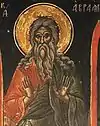 |
Abraham | Ibrāhīm | Avraham | Genesis 17:3–5 | Quran 2:124 | |
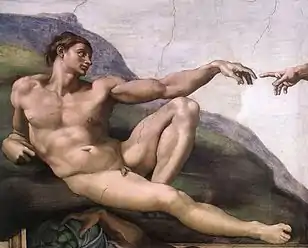 |
Adam | Ādam | Adam | Genesis 5:2 | Quran 3:59 | |
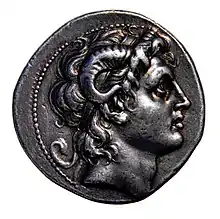 |
Alexander the Great | Most Western and traditional Muslim scholars generally identify Alexander the Great as the "Dhul-Qarnayn",[2][3] this ultimately derive from the image of Alexander wearing the horns of the ram-god Zeus-Ammon, as popularised on coins throughout the Hellenistic Near East.[4] and Alexander is mentioned by name in the Deuterocanonical Book of 1 Maccabees.[5] | 1 Maccabees 1:1 | Quran 18:83 | ||
| Amram | ʿImrān | Amram | Islamic tradition holds both Amram and Joachim being named the same just like Joachim's daughter Mary, the mother of Jesus, ("Mariam") and Amram's daughter Miriam. Although Islamic studies of the beginning of the 20th century tended to note genealogical discrepancies, in more recent Islamic Studies of the 21st century the general consensus is, according to Angelika Neuwirth, Nicolai Sinai & Michael Marx, that the Quran does not make a genealogical error but instead makes use of Typology.[6] This is, following Wensincks conclusion, supported by the figurative speech of the Quran and the Islamic tradition: "Maryam is called a sister of Hārūn and the use of these three names ‘Imrān, Hārūn and Maryam, has led to the supposition that the Kur'ān does not clearly distinguished between the two Maryams, of the Old and the New Testaments. It is not necessary to assume that these kinship links are to interpreted in modern terms. The words "sister" and "daughter", like their male counterparts, in Arabic usage can indicate extended kinship, descendance or spiritual affinity. Muslim tradition is clear that there are eighteen centuries between the Biblical ‘Amram and the father of Maryam".[7][8] Similarly, Stowasser concludes that "to confuse Mary the mother of Jesus with Mary the sister of Moses and Aaron in Torah is completely wrong and in contradiction to the sound Hadith and the Qur'anic text as we have established".[9][10] | Exodus 6:20 | Quran 3:33 | |
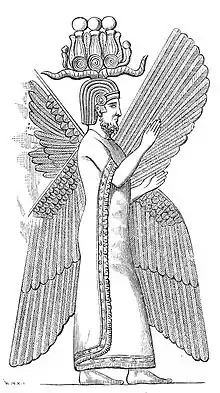 |
Cyrus the Great | Dhul-Qarnayn | a theory that identifies Cyrus with the Dhul-Qarnayn, a figure mentioned in verses 18:83-98 of the Quran, with Cyrus the Great.[11] (He is most commonly identified with Alexander the Great).[12] Proposed by the German philologist G. M. Redslob in 1855, it failed to gain followers among Western scholars,[13] | Isaiah 45:1–4 | Quran 18:83 | |
 |
King David | Dāwūd | Dawid | 1 Samuel 17:58 | Quran 2:251 | |
.jpg.webp) |
The Apostles | al-Hawariyyūn | Mark 3:16–19 | Quran 61:14 [14] | ||
| Elijah (Elias) | Ilyās | Eliyyahu | 2 Kings 1:8 | Quran 37:123 | ||
.jpg.webp) |
Elisha | al-Yasaʿ | Elishaʿ | can also be pronounced Alīsaʿ | 1 Kings 19:16 | Quran 6:86 |
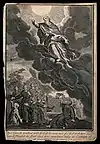 |
Enoch | Idrīs | Chanokh | he is not universally identified with Enoch, many Muslim scholars of the classical and medieval periods also held that Idris and Hermes Trismegistus were the same person.[15][16] | Genesis 5:24 | Quran 19:56 |
.JPG.webp) |
Ezekiel | Ḥizqīl "Dhul-Kifl" | Yechezkel | Ezekiel 1:3 | Quran 38:48 | |
 |
Ezra | ʿUzayr | Ezra | Ezra 7:1 | Quran 9:30 | |
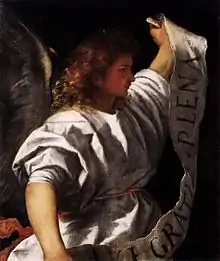 |
Gabriel | Jibrīl | Gavri'el | Luke 1:19 | Quran 2:97 | |
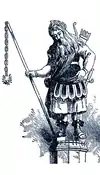 |
Gog and Magog | Ya'juj wa-Ma'juj | Gog U-Magog | Ezekiel 38:2 | Quran 21:96 | |
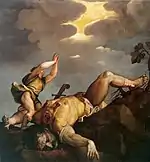 |
Goliath | Jālūṭ | Golyat | 1 Samuel 17:4 | Quran 2:251 | |
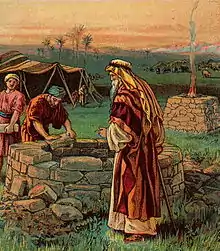 |
Isaac | Isħāq | Yitzhak | Genesis 17:19 | Quran 19:49 | |
 |
Ishmael | Ismāʿīl | Yishmaʿel | Genesis 16:11 | Quran 38:48 | |
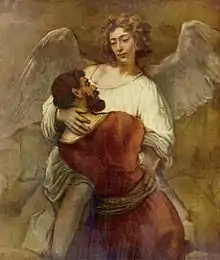 |
Jacob | Yaʿqūb | Yaʿkov | Genesis 32:1 | Quran 19:49 | |
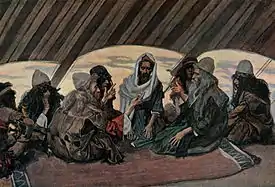 |
Jethro | Šuʿayb | Yitro | Exodus 3:1 | Quran 26:177 | |
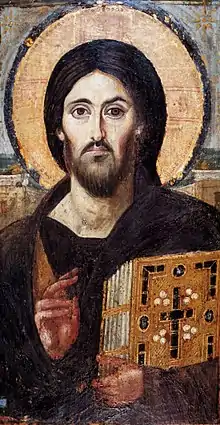 |
Jesus | ʿĪsā | Yeshua | Matthew 1:16 | Quran 3:59 | |
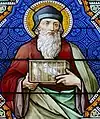 |
Joachim or Heli | ʿImrān | Yehoyaqim | Islamic tradition holds both Joachim and Amram being named the same just like Joachim's daughter Mary, the mother of Jesus, ("Mariam") and Amram's daughter Miriam, though the Quran only refers to Joachim with the name of Amram probably as a play on the sharing of names and even calls Mary the sister of Aaron,[17] Muslims see this as connecting the two women from two prophetic households in spirit, Although Many people see this as a mistake, This question was actually reported to have been put across to Muhammed during his time and he replied: "The (people of the old age) used to give names (to their persons) after the names of Apostles and pious persons who had gone before them".[18] Although there is no single evidence that this practice happened in the 1st century BC.[19] | Luke 3:23 | Quran 19:28 |
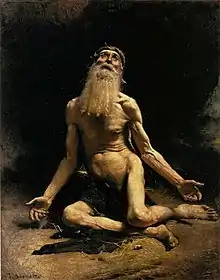 |
Job | ʾAyyūb | Iyyov | Job 1:1 | Quran 6:84 | |
 |
John the Baptist | Yaḥyā | Yohanan | Yaḥyā means 'living' as opposed to Yūḥānna ('graceful'), which comes from Hebrew Yoḥanan. | Luke 1:13 | Quran 19:7 |
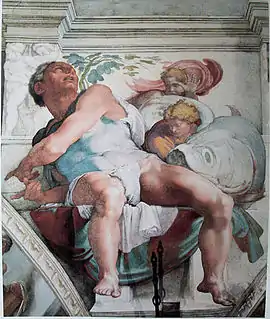 |
Jonah | Yūnus "Dhun-Nun" | Yonah | Possibly derived from Greek Ionas | Jonah 3:4 | Quran 37:139 |
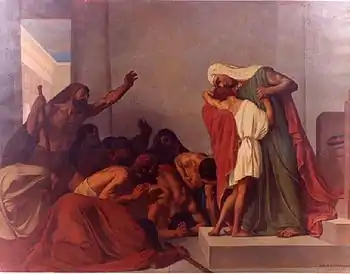 |
Joseph | Yūsuf | Yosef | Genesis 30:24 | Quran 6:84 | |
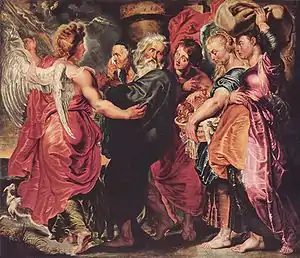 |
Lot | Lūṭ | Lot | Genesis 11:27 | Quran 66:10 | |
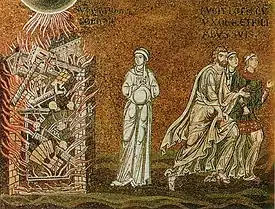 |
Lot's wife | Lūṭ's wife | She is nameless both in the Bible and in the Quran. | Genesis 19:26 | Quran 26:170 | |
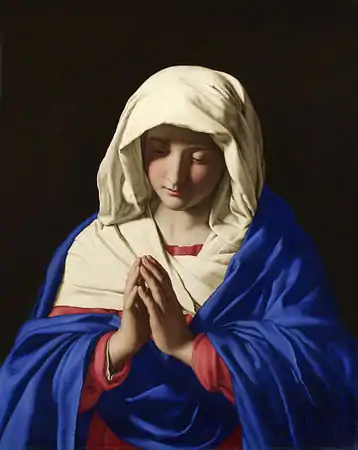 |
Mary | Maryam | Mariam | Matthew 1:16 | Quran 19:34 | |
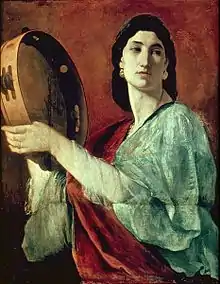 |
Miriam | Mūsā's sister | Miriam | Exodus 6:20 | Quran 28:11 | |
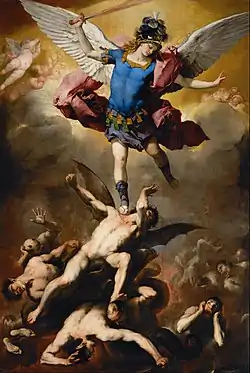 |
Michael | Mīkāīl | Mikhael | Revelation 12:7 | Quran 19:54 | |
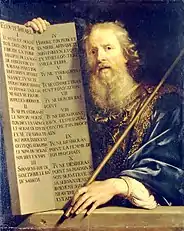 |
Moses | Mūsā | Moshe | Exodus 6:20 | Quran 33:7 | |
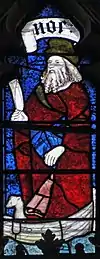 |
Noah | Nūḥ | Noah | Genesis 5:29 | Quran 33:7 | |
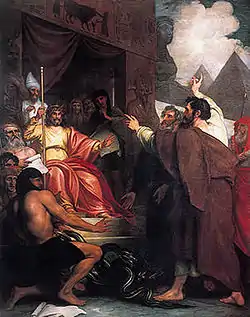 |
Pharaoh | Firʿawn | Paroh | Exodus 1:11 | Quran 20:60 | |
.jpg.webp) |
Queen of Sheba | Queen of Sabaʾ; Bilqīs | Malkat Saba | She is nameless both in the Bible and in the Quran. but The name Bilqīs or Balqīs comes from Islamic tradition. | 1 Kings 10:1 | Quran 27:29 |
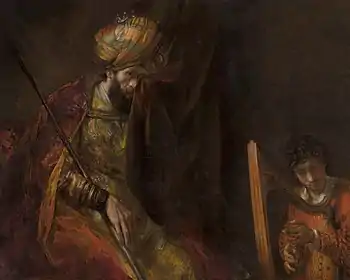 |
Saul the King | Ṭālūt | Sha'ul | Literally 'Tall'; Meant to rhyme with Lūṭ or Jālūṭ. | 1 Samuel 17:33 | Quran 2:246 |
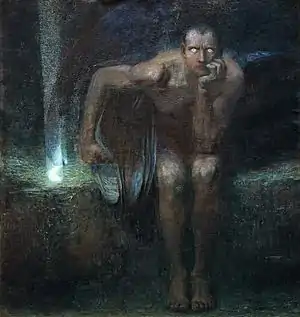 |
Devil or Satan | Shaytān / Iblīs | HaSatan | Iblīs, literally 'despaired'; Possibly derived from Greek Diabolus. | Genesis 3:14 | Quran 7:11 |
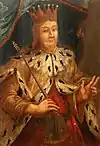 |
Solomon | Sulaymān | Shlomoh | 1 Kings 10:23 | Quran 34:12 | |
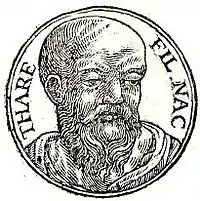 |
Terah | Āzar (Tāraḥ/Tārakḥ among Arab genealogists and Shiites) | Terah | There is a disagreement with regards to Āzar being Abraham's biological father or uncle.[20][21]
[22] It is claimed that Āzar is derived from Syriac Āthar (See Church History (Eusebius)), which is derived from Hebrew Táraḥ, Thara or Zarah. |
Genesis 11:24 | Quran 6:74 |
_-_Zacharias_by_shakko.jpg.webp) |
Zechariah | Zakariyyā | Zekaryah | Luke 1:13 | Quran 19:7 | |
| Zimri (prince) | al-Samiri (Islamic figure) | Zimri ben Salu | Al-Samīri is derived from Eastern Syriac 'Zamri, which is derived from Hebrew Zimri. | Numbers 25:14 | Quran 20:85 |
Not identified by name in the Quran
Sarah, Hagar, Zipporah, Elizabeth, Raphael, Cain and Abel, Korah, Joseph's brothers, Potiphar and his wife, Eve, Jochebed, Samuel, Noah's sons, and Noah's wife are mentioned, but unnamed in the Quran. Sarah, Hagar, Elizabeth, Eve, Cain and Abel have the respective names: Sara, Hajar, al-Isbat, Hawah, Qabil and Habil in Islamic tradition.
See also
References
- Quran 19:28
- Panayotakis, Stelios; Zimmerman, Maaike; Keulen, Wytse (eds.). The Ancient Novel and Beyond. Brill Academic Publishers NV. ISBN 978-90-04-12999-3.
- EI2, p. 127.
- Pinault, David (1992). Story-Telling Techniques in the Arabian Nights. BRILL. ISBN 978-9004095304.
- All of Chapter 1, verses 1–7 was about Alexander and this serves as an introduction of the book. This explains how the Greek influence reached the Land of Israel at that time.
- Michael Marx: Glimpses of a Mariology in the Qur'an; in: A. Neuwirth, Nicolai Sinai, Michael Marx (Hrsg.): The Qur'ān in Context. Historical and Literary Investigations into the Qur'ānic Milieu. Leiden 2011. pp. 533–563.
- Arent Jan Wensinck: Maryam. In: A. J. Wensinck, J. H. Kramers (Hrsg.): Handwörterbuch des Islam. pp. 421–423.
- A. J. Wensinck (Penelope Johnstone), "Maryam" in C. E. Bosworth, E. van Donzel, W. P. Heinrichs & Ch. Pellat (Eds.), The Encyclopaedia Of Islam (New Edition), 1991, Volume VI, p. 630. Maryam is called a sister of Hārūn (sūra XIX, 29), and the use of these three names ‘Imrān, Hārūn and Maryam, has led to the supposition that the Kur'ān does not clearly distinguished between the two Maryams, of the Old and the New Testaments. The Kur'ān names two families as being especially chosen: those of Ibrāhim and of ‘Imrān (sūra III, 32). It is the family of ‘Imrān, important because of Moses and Aaron, to which Maryam belongs. It is not necessary to assume that these kinship links are to interpreted in modern terms. The words "sister" and "daughter", like their male counterparts, in Arabic usage can indicate extended kinship, descendance or spiritual affinity. This second ‘Imrān, together with Harun, can be taken as purely Kur'ānic... Muslim tradition is clear that there are eighteen centuries between the Biblical ‘Amram and the father of Marya.
- B. F. Stowasser, Women In The Qur'an, Traditions, And Interpretation, 1994, Oxford University Press: New York, p. 393-394.
- Aliah Schleifer, Mary The Blessed Virgin Of Islam, 1998, op. cit., p. 36.
- Azad, Abul Kalam (1990). India's Maulana Abul Kalam Azad. Indian Council for Cultural Relations.
- Wheeler 2006, p. 182.
- Tatum, James (1994). The Search for the ancient novel. Johns Hopkins University Press. p. 342. ISBN 978-0-8018-4619-9.
- Quran 61:14
- W.F. Albright, Review of Th. Boylan, The hermes of Egypt, in Journal of the Palestine Oriental Society 2 (1922), 190-8
- H. T. Halman, "Idris," in Holy People of the World: A Cross-Cultural Encyclopedia (ABC-CLIO, 2004), p. 388
- Clooney S.J., Francis X., "What Islam really teaches about the Virgin Mary", America, December 18, 2015
- 60 hadith found in 'The Book on General Behaviour (Kitab Al-Adab)' of Sahih Muslim.
- Those Things are well explained in this video https://www.youtube.com/watch?v=GNKWBD3k77s&t=120s
- "Was Azar the Father of Prophet Abraham?". Al-Islam.org. 2013-11-12. Retrieved 2020-09-30.
- "Suratul Baqarah: Verses 62". Al-Islam.org (in Spanish). 2013-01-30. Retrieved 2020-09-30.
- "Marriage". Al-Islam.org. 2012-10-04. Retrieved 2020-09-30.
Bibliography
- Wheeler, Brannon (2006). "Dhu Al-Qarnayn". In Leaman, Oliver (ed.). The Qur'an: An Encyclopedia. Taylor & Francis.
This article is issued from Wikipedia. The text is licensed under Creative Commons - Attribution - Sharealike. Additional terms may apply for the media files.